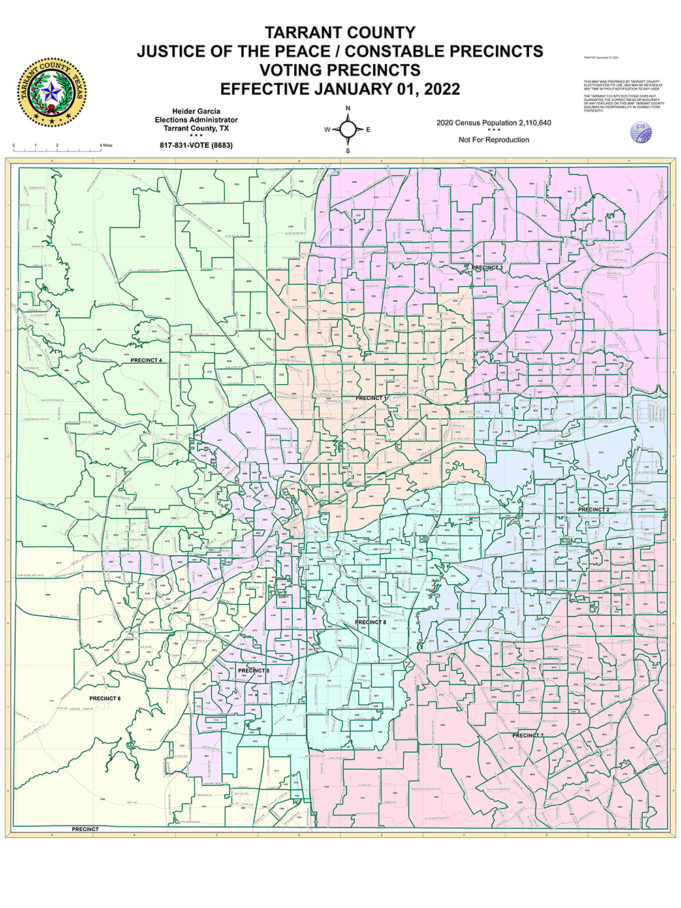Voter suppression laws are often passed under the guise of “voter integrity” measures that aim to prevent voter fraud even though documented cases of illegally cast ballots are infinitesimally rare — accounting for around .0003% of ballots cast nationwide, according to the nonpartisan Brennan Center for Justice. When voting irregularities are found, they are often the unintentional result of voter errors or administrative mistakes.
In October, Texas lawmakers adopted a new statewide district map that was designed to keep Republicans in power for the next 10 years. Ethnic minorities accounted for 95% of the Lone Star State’s population growth over the past decade, yet two new congressional districts were drawn to represent white Texans, who are far more likely to vote Republican.
That same kind of gerrymandering may be playing out in Tarrant County. On Monday, the U.S. Justice Department filed a lawsuit in federal court that challenges Texas’ redrawn congressional and state legislative districts. The DOJ alleges that the maps are intended to dilute the voting power of Blacks and Hispanics. Indicted State Attorney General Ken Paxton said in a tweet that the accusations are “absurd.”
The Real Voter Frauds?
A recently filed lawsuit alleges that Tarrant County’s three Republican commissioners colluded with five Republican justices of the peace when adopting a JP precinct map that eliminates political opponents for two incumbent Republican JPs and allegedly diminishes the voting power of ethnic minorities in the county.
Over the course of 90 minutes on Nov. 9, the five white Republican JPs presented to the commissioners a plan for an eight-precinct map that redrew the boundaries that define where the county’s eight JPs and eight constables could run for office and serve. The JPs showed the map to the county’s three ethnic minority JPs only the day before the commissioners’ meeting. It quickly drew objections from the snubbed elected officials, who allege the map is a ploy to dilute the voting power of minorities and eliminate political challengers for two Republican JPs ahead of next year’s county elections.
The final 3-1 vote by the five commissioners — Devon Allen, one of two Black commissioners, abstained — to adopt the map will now be the subject of at least two lawsuits filed by local attorney Steve Maxwell, a board-certified trial lawyer who has successfully mediated more than 500 cases and litigated more than 100 jury trials that involved medical malpractice and deceptive trade practices.
“Frankly, it is shameful that the Republican commissioners and JPs schemed to put a boundary-change map together without following the protocol used in the past, whereby all of the affected parties could evaluate those changes and make proposals based on community input,” Maxwell told us.
In the coming weeks, Maxwell and his team will file a federal lawsuit to determine the constitutionality of the new JP/constables map.
“We will be filing a federal Voting Rights Act lawsuit under Section 2,” he said, referring to the section that protects minority representation during redistricting.
Blue Zones Project Donation Aims to Improve Traffic Safety
Road fatalities are on the rise in Texas. Nearly 4,000 Texans were killed in automobile crashes last year, up from 3,623 deaths the year before. To address traffic accidents in underserved communities, Fort Worth City Council recently accepted $100,000 from North Texas Healthy Communities and Blue Zones Project Fort Worth to fund a pilot project that will install “traffic safety countermeasures” in majority-minority areas that are disproportionately impacted by traffic crashes.
Recent reporting by the Washington Post found that Black drivers are 25% more likely to die in traffic accidents than white drivers. Black neighborhoods tend to have more dangerous roads and fewer safety precautions, the reporting found.
The local effort to shore up those inequities will include the addition of pavement markings, signage, roundabouts, sidewalks, and curb extensions, according to a city press release.
In the coming months, city staffers will hold community meetings to listen to residents’ concerns and to identify projects that can address those concerns.
Lawsuit Against Fort Worth Police Moves Forward
In June, we reported on legal actions filed by Lorenzo Thomas, a formerly unhoused Black man who alleges that Fort Worth police officers harassed him and placed his life in peril (“ Targeted for Being Homeless?” June 9). Thomas believes he was targeted because he was living on the streets in an area of downtown that Fort Worth’s movers and shakers want free of homeless people.
According to documents filed as part of the lawsuit, three officers restrained Thomas inside a police car in mid-2019 with the stated intention of driving him to Arkansas, where he had an outstanding warrant. The idea that police officers would take an entire day away from their normal duties to drive him across state lines for a marijuana possession charge struck Thomas as bogus and a possible ruse to do bodily harm to him. Thomas resisted, and, according to the ongoing lawsuit, one or more officers pepper-sprayed him, which led to asphyxiation and subsequent hospitalization.
Thomas said in a recent email that a Tarrant County court is moving forward with the lawsuit. The defendants have been served, he said, meaning that they may soon be testifying in court. Whether through mediation or a civil court trial, Thomas said he hopes there will be a quick resolution to the litigation.
Republican Candidate Enters DA Race
Judge Phil Sorrells of Tarrant County’s 10th Criminal Court has filed to run for district attorney next November. The filing makes Sorrells the first Republican to enter the race that has two Democratic contenders: Tiffany Burks and Albert Roberts. Tarrant’s Republican DA Sharen Wilson announced last month that she will not seek reelection next year. The decision to step down after eight years in office came as her administration failed to convince voters to pass a $160 million county bond that would have provided funds for facilities, building upgrades, and new equipment.
Forest Park Pool Construction to Begin Late Next Year
City officials recently reversed course on a plan to replace the nearly 100-year-old Forest Park Pool with a smaller pool. Concerns over the high cost of repairing and maintaining the pool that is located just southeast of the Fort Worth Zoo had prompted city staff to make the recommendation. In September, around 150 concerned area residents voiced opposition to the plan. Their primary concern was a reduction in size of the pool.
Under the new plan, the city will rebuild the aging pool beginning in October 2022 with a project end date of early 2024. The timeline will allow the community gathering space to remain open for the 2022 swim season, a city spokesperson told us. The demolishing and reconstructing of the pool, along with replacing the bathhouse and adding parking, will cost taxpayers $11.9 million.
City Redistricting on One-Month Pause
Fort Worth’s redistricting efforts are on a one-month pause following a disagreement between city councilmembers and the city’s redistricting task force, the 11-member group that city council appointed to review voting map proposals from citizens, councilmembers, civic groups like Citizens for Independent Redistricting, and city staffers. A total of 19 maps that will add two new districts to the current eight were submitted for consideration to the task force even though some mapmaking groups complained that the city’s mapping software was onerous to use.
Assistant city manager Fernando Costa told us that the majority of city councilmembers recently expressed concern about competing with city staff during the competitive selection process that was scheduled to wrap up this month. Under the new timeline, city council will likely vote to adopt a final map in March.
Councilmembers “requested that we amend the redistricting procedures to delete a requirement for staff to produce a map that would be considered by the task force,” he told us, referring to a directive that aimed to eliminate the perceived conflict of interest caused by city staffers submitting maps that competed with entries by city councilmembers.
Three of the four maps ranked highly by the task force were drafted by city staff, which led to a tussle over whether eliminating city staff entries simply to appease councilmembers was really a smart move. Fort Worth’s city council has the entire month of December to decide whether the city staff maps will be valid or not.
Bruce Miller with Citizens for Independent Redistricting said city staffers should reopen the submission process to the general public since there is now a one-month pause in the process.
“Since the software was challenging to implement, even for city staff members, that would provide an opportunity for mapmakers to refine their final submissions,” he said.
Miller said that the timeline for submitting has been a moving target that has caused confusion among civic-minded locals who wish to participate in the map-drawing process.
“It’s important to keep in mind that the ultimate goal is to produce the best district map for the citizens of Fort Worth for the coming decade,” he continued. “The actual identity of the map creator should not play a role in the outcome. All contributions need to be considered equally on their merits.”












